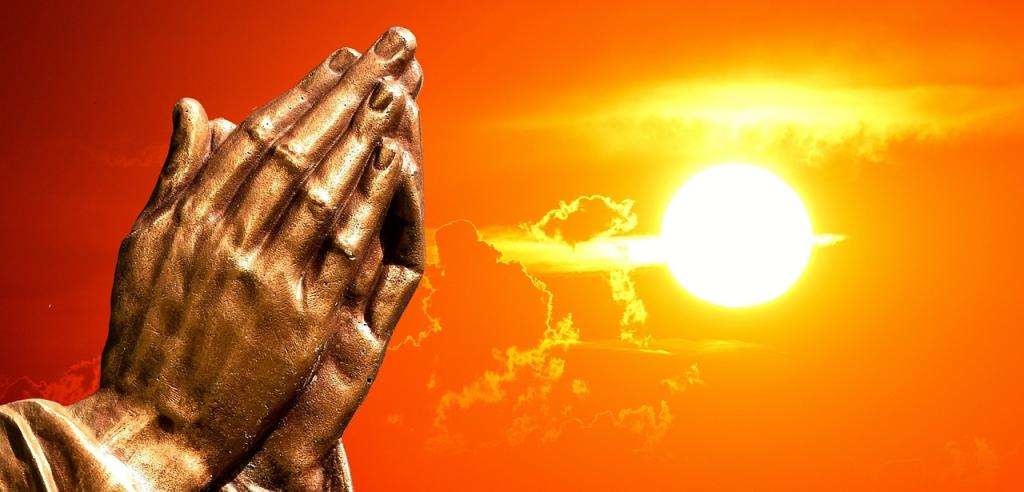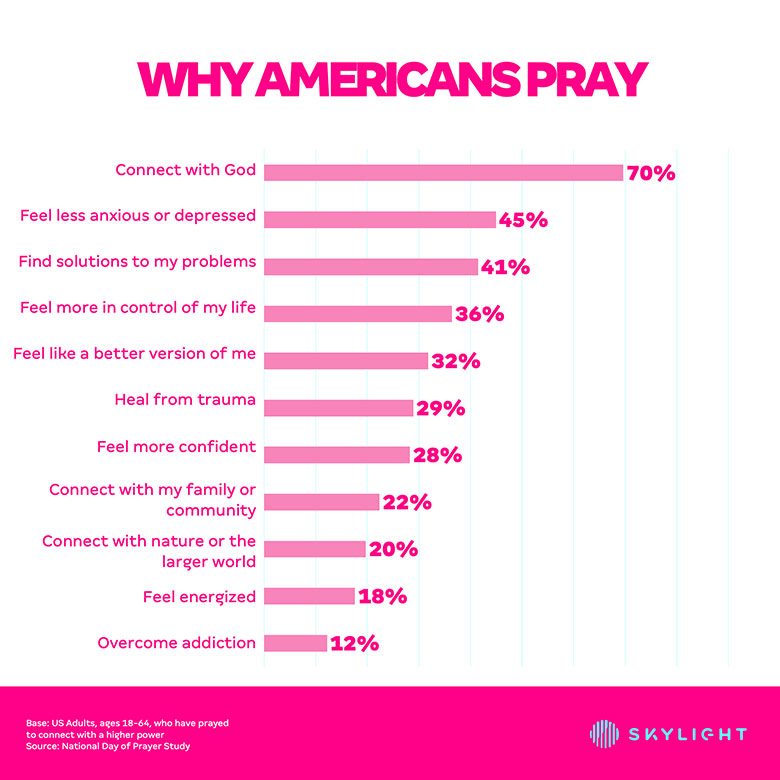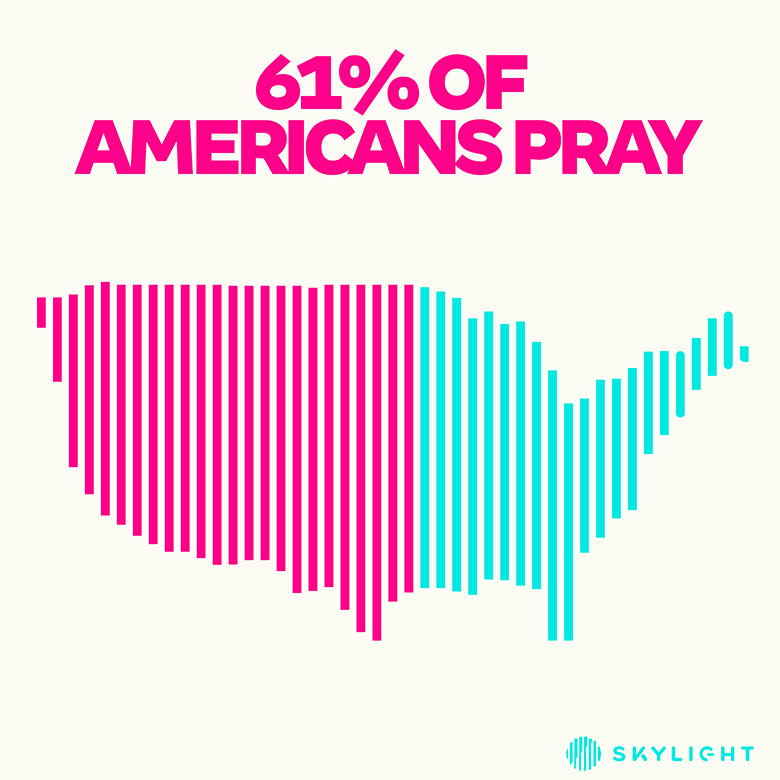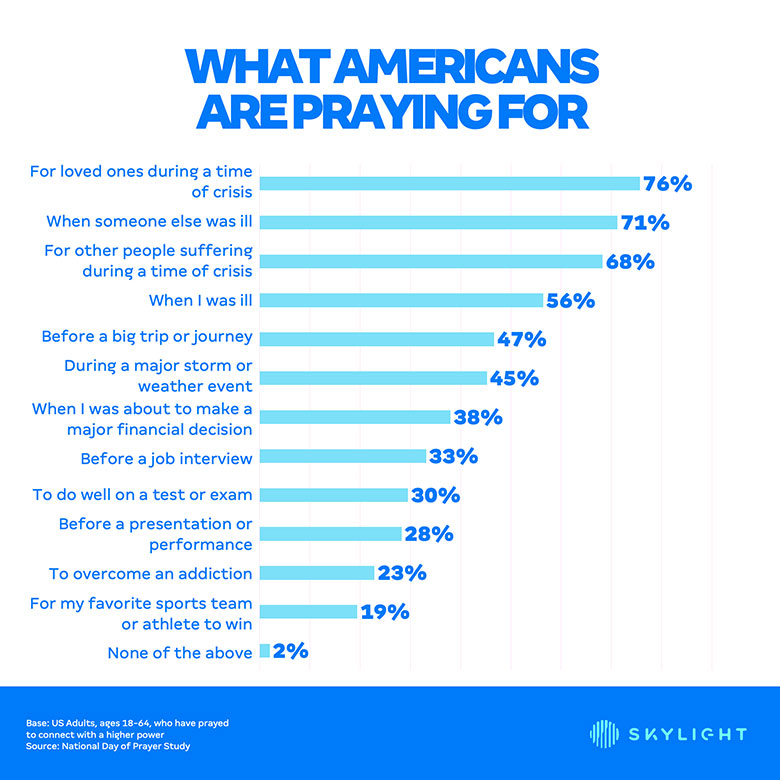
New comprehensive survey from Skylight Answers These Questions & More
Christianity and church attendance in America are declining, but Americans are still praying. So says a comprehensive nationwide survey commissioned by Skylight, a partner company of Patheos whose app brings people “a world of fresh content from spiritual specialists: meditations, guided prayers, spiritual yoga and more.” The survey, released today, which is the National Day of Prayer 2023, answers such questions as:
- Why do Americans pray?
- What do we pray for?
- How do we connect with our higher power?
- When and where do we pray?
- Does God answer our prayers?
You can check out the entire survey by clicking on the Skylight links throughout this article.
City Square Associates, a market research company, surveyed a nationally representative sample of adults ages 18-64 from April 6-17. It is one of the most in-depth surveys of its kind on prayer ever commissioned, the organization said.
Different Perspectives on Prayer
Patheos invited a number of its contributors to share their thoughts about the survey. I’m writing from the perspective of an American Christian, and I have read several of the articles posted prior to mine.
The most interesting to me were two articles by Muslim contributors. You can read Prayer in the Eyes of Americans here and Survey on Prayer and Perspective of a Muslim here.
I find these two posts particularly interesting because I know very little about Islam and am curious about Muslims’ beliefs. The world would be a much better place if people had a better understanding and respect for one another. I can’t change the world except in my little part of it, and I’m attempting to do just that.
Why Do Americans Pray?
Americans are still praying despite their issues with the Christian church. A significant majority of those who pray – nearly two-thirds, in fact – said they pray to connect with God, while nearly half said praying makes them less anxious or depressed and a little more than 40 percent said they find solutions to their problems through prayer.
Praying brings a sense of calmness, gratitude, connection and optimism, among other things, the Skylight survey also revealed. You can check out the survey by clicking here.
How Has Fervent Prayer Helped Me?
As a Patheos contributor, I find it ironic that the survey was released three days after I posted a heartfelt article on prayer called Dear Lord, Are You There? How God Answered My Most Earnest Prayers.
In the post, I wrote about two times when I prayed with great intensity and earnestness, and God answered in very specific and definite ways. His answers left absolutely no doubt in my mind that the responses came from him because of my prayers. And the experience was both humbling and powerful.
The first time I ever prayed to the depths of my very soul was when my beloved grandmother lay in a hospital bed on the brink of death. She had leukemia, as well as two blood clots in one lung, and her doctor didn’t expect her to survive the night.
I did the only thing I knew to do. I turned to God. I’ll admit that I wasn’t sure prayer would work, but there was nothing else I could do. I prayed for her all day and into the night and by morning, I knew God had responded.
For some reason, I asked God to give me one more year with her. You may find it hard to believe, but she lived almost one year to the day after I prayed so earnestly. It was an answer to my prayers, and no one will ever convince me otherwise.
Many years later, I reached a turning point in my life and fervently prayed for guidance. I prayed a series of prayers over a period of years, and God answered those prayers over an equally long period. Click here to read my post.

What Do Americans Pray for?
People mainly pray for other people, the Skylight survey found.
- More than three-fourths of Americans who pray said they pray for loved ones in crisis.
- More than 70 percent of survey respondents said they pray for someone else who is ill.
- Slightly less than 70 percent reported praying for other people who are in crisis.
They also pray, but in smaller numbers, for themselves when they are sick, before a big trip or when experiencing a major weather event. They pray for guidance on major financial decisions; for help on exams, job interviews, presentations or performances; and for support in overcoming an addiction.
As a member of my church’s prayer team, I can attest to the fact that most people who request prayer want the team to pray for someone close to them. They almost never request prayer for themselves.
Learn more from the Skylight survey by clicking here.
How Do We Connect with God or Our Higher Power?
Americans are still praying. It’s the most common way we connect with God or our higher power. Nearly two-thirds of those who connect with a higher power said they pray, while a little less than 40 percent said they meditate or practice mindfulness. Only 15 percent said they don’t connect with any kind of higher power.
This tells me that people BELIEVE in God or some other supreme being, and they WANT a connection with him, her or whatever form the being takes. Other survey results show that the connection is meaningful.
The fact that 15 percent don’t connect to a higher power saddens me. It’s a small percent, but it represents a large number of people. I have sometimes wondered how atheists and agnostics survive the crises in their lives.
Where do they find strength, guidance and solace? Friends and family may provide support, but they can’t offer the same kind of support that God provides. I know that for a fact.
I also have wondered what my life would be like if I didn’t believe in God. It’s almost unimaginable, but I know it would be hollow and meaningless for me.
Learn more from the Skylight survey by clicking here.

When and Where Do Americans Pray?
Americans pray in a variety of places throughout the day. The Skylight survey found that we pray when we wake up in the morning and go to bed at night. We also pray at home as well as at work, when we are waking up, during our commute to and from school or work, or while we are exercising, having a meal and going to bed.
I pray throughout the day, regardless of what I’m doing, and am convinced that prayer enriches my life.
An Important Disconnect
Prayer is an integral part of many Americans’ lives, the Skylight survey indicated. Yet, the Pew Research Center has reported in more than one survey that a large number of Americans don’t attend church and the number is declining.
I recently posted an article, How Can Christian Churches Reach Millennials? that addressed the decline. Click here to read it. Christians who don’t understand the disconnect may be unfamiliar with comments Mahatma Gandhi made many years ago when he said he liked Christ but not Christians. He probably wasn’t alone in feeling that way.
Rather than looking for other Christians to blame, we need to look in the mirror. Christians are Christ’s representatives on earth, and we need to ask ourselves whether our beliefs and behaviors truly reflect his teachings. Do we really love the Lord with all our hearts, souls and minds, and does our behavior reflect this love? Do we love one another as we love ourselves? Do we truly repent of our sins and stop living those sins?
But I digress…
Does God Answer Our Prayers?
That’s a good question, and it leads to another question: If our prayers aren’t answered, why do we continue to pray?
Prayer isn’t an invention of the 21st century. People probably have prayed since the beginning of human history, and I’m convinced that they — we — wouldn’t continue to pray if God didn’t answer prayers.
Americans are still praying, and a large majority of those of us who pray — 87 percent in fact — reported that God has answered their prayers within the last year. Eighty-seven percent according to the Skylight survey. That’s an amazingly high figure.
How Has God Answered My Prayers?
My prayer experiences are in line with the majority of survey participants who believe God answers prayers. God has answered my prayers — both life-changing prayers and small ones.
We are happiest when he grants our requests, of course, but we need to remember that God doesn’t always give us what we want, especially when the things we want aren’t good for us. He also may answer “not yet” when he knows that we aren’t ready to receive whatever we have requested.
Of all my answered prayers, one of the most dramatic involved my grandmother, which I described earlier in this post. Another involved my need for guidance later in life. I described both of these times in Dear Lord, Are You There? How God Answered My Most Earnest Prayers in my Woman to Woman blog. You can read that post here.

What Happened to ‘Sam’?
A third dramatic answer to prayer involved a distant cousin of mine, whom I’ll call Sam for privacy reasons. Sam had a cancerous abdominal tumor. He lived near me and attended my church, which made his illness more evident to me than it might otherwise have been.
Sam was scheduled for surgery to remove the tumor, and members of our small church prayed in earnest for his recovery.
The surgeon told Sam’s wife and children that the procedure would last about two or three hours, and so the surgery began on the appointed day. Two hours passed, then three and then four.
After five hours or so, my cousin’s family was told that the surgery was not yet finished, which caused a great deal of concern. Finally, a nurse came to the waiting room to announce that the surgery had ended and the surgeon would meet with the family shortly.
Sam’s family was shocked by what the surgeon said. He told them he had been unable to find the tumor. It had been clearly visible on a recent x-ray, and now it was gone. The surgery had lasted longer than expected because the surgeon wanted to make absolutely sure it was gone. He had even asked his partner to double check. The tumor was definitely gone.
In the weeks and months that followed, Sam had regular imaging studies made of his abdomen to make sure the tumor didn’t return. He lived a long and full life, and the tumor never did return. God had taken care of it.
See the Skylight Survey
The Skylight survey has a good deal more to say about Americans and prayer. To see the findings, click here.


















